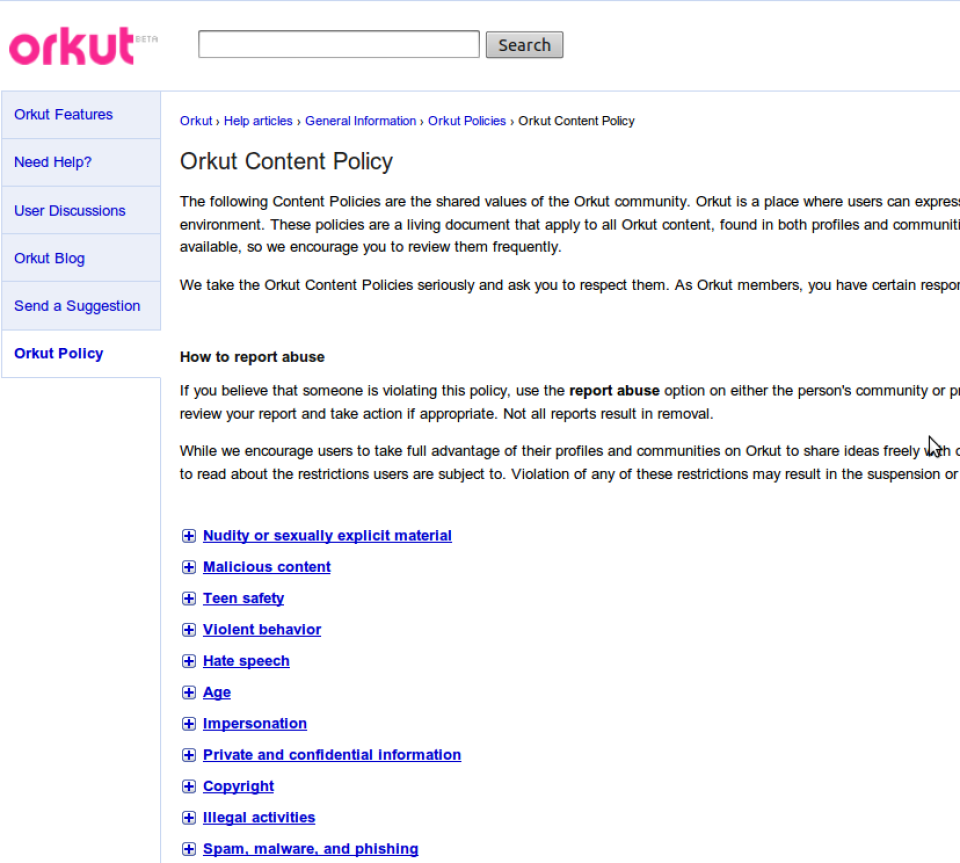
For the Brazilian case study conducted as part of the EROTICS research project, the authors’ exploration of the intersections between internet regulation and sexuality included an analysis of two “communities” or groups on the social networking site Orkut.
The first community essentially a forum for anti-lesbian prejudice, including forms of verbal harassment and abuse. The second is a virtual community aimed at legitimising romantic relationships between adults and adolescents, which actively contests the use of the term “paedophilia” to describe these relationships.
Now then, anyone who has timidly peeked – or wholeheartedly dived – into the world of social networking sites like Orkut will have noticed that there is a lot of silliness and superficiality. But there is also a considerable amount of much more serious, more profound activity, such as the defence of social, political and environmental causes, among others. And so, why not, lesbophobia and a subtle justification of paedophilia?
Let’s start with the first community: “É lésbica pq não viu meu pinto” ("She’s a lesbian because she never saw my cock"). It’s interesting to note that when you click on the link to the community, a warning message from Orkut pops up first:
“The community you wish to access may contain content that could be inappropriate for some users. Learn more » If you would like to view the community anyway, click proceed below.”
I decided to proceed. And I must say, it wasn’t a pleasant experience, to say the least. Pretty stupid of me, right? I mean, Orkut warned me that I might encounter content that could be inappropriate for some users. And yes, it is inappropriate for users like me, obviously. But that leads me to the question: Who exactly is it appropriate for?
In any case, while checking out the community forum, it was interesting to read the reactions to a post from a member of the community (apparently a member in the sense that he or she had joined the community, but not in the sense of being a participant in the lesbophobic crusade) that this particular community had been reported to an agency that protects the rights of internet users. These were some of the responses:
“If they shut down the community, no problem… We’ll just start up another one…”
“It’s not hard to create a community. And just to screw with them we’ll start another one and make it much more interactive.”
“As if ‘reporting’ actually accomplished anything…”
“Women have no sense of humour.”
“If they could they would have made a female-version copy of the community a long time ago, but since they don’t have the balls to do it, they just keep nattering in other people’s ears.”
“SaferNet is worried about a cock? Come on, it’s not offensive to anyone, shit!”
At the end of the list of comments, there has been a message that said: “Some replies on this page have been deleted or are under review.”
But what is really interesting about this community is not the opinions of the people who created it and participate in the anti-lesbian crusade. What is much more interesting to explore is the online activity of women who challenge these offensive, bigoted and discriminatory comments, women who might not necessary label themselves as “activists”.
The other Orkut community studied in the EROTICS Brazil report was “Anti Preconceito Inter Etário”(“Against Inter-Age Prejudice”) . The community’s self-description declares that it is aimed at fighting against “a bias that is growing in Brazil, though few people realise it: the prejudice against inter-agers (those that are in a relationship with someone much older or much younger).” And it adds: “Age prejudice is forbidden according to the Brazilian Constitution of 1988 (Article 3, IV).” Yes, what you’re into is all very legal.
Although this is a moderated community, while the EROTICS Brazil team was conducting its research, it was open to non-members, meaning that its forum contents could be viewed by anyone with Orkut access. However, since then, its content has been closed to non-members, as I discovered when I visited the site while writing this piece.
Many paedophilia-related communities have been shut down by Orkut, but this “inter-age love” group is still alive and kicking, thanks to the semantic shuffling it uses to veil the real subject of this virtual community.
As highlighted by the EROTICS Brazil research team, the everyday investments that engaged individuals make online are quite relevant. The mobilisation of both male and female internet users on behalf of lesbians in response to attacks on their right to freely exercise their sexuality challenges conventional understandings of activism, participation, sexual rights, and the role of the internet in the fight against sexual prejudice and violence.
The creation of an online community to address the controversial issue of inter-age sexual relationships clearly demonstrates that creativity is a resource within reach of all interests.
But as the report from Brazil also stresses, both online communities with their vivid and engaged debates about sexuality, sexual discrimination and prejudice serve as counterpoint to the low level of interest of Brazilian feminist and LGBT activists in the internet regulation policy debate, nor in the controversies around child pornography that contaminated this debate.
Forms of sexual rights activism are changing and banners are becoming virtualised. And when I say banners, I mean *all* banners. So now we know where many of the battles – many of which are semantic – are currently taking place, and of course, it’s better to be a part of them.
- 7473 views






Add new comment